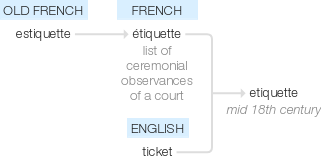Etiquette
mid 18th century: from French étiquette ‘list of ceremonial observances of a court’, also ‘label, etiquette’, from Old French estiquette (see ticket).
wiktionary
1740, from French étiquette(“property, a little piece of paper, or a mark or title, affixed to a bag or bundle, expressing its contents, a label, ticket”), from Middle French estiquette(“ticket, memorandum”), from the Old French verb estechier, estichier, estequier(“to attach, stick”), (compare Picard estiquier(“to stick, pierce”)), from Frankish *stekan, *stikkan, *stikjan(“to stick, pierce, sting”), from Proto-Germanic *stikaną, *stikōną, *staikijaną(“to be sharp, pierce, prick”), from Proto-Indo-European *(s)teyg-(“to be sharp, to stab”).
Akin to Old High German stehhan(“to stick, attach, nail”) (German stechen(“to stick”)), Old English stician(“to pierce, stab, be fastened”).
The French Court of Louis XIV at Versailles used étiquettes(literally “little cards”) to remind courtiers to keep off of the grass and similar rules. More at stick (verb) and stitch. Doublet of ticket.
etymonline
etiquette (n.)
1750, from French étiquette "prescribed behavior," from Old French estiquette "label, ticket" (see ticket (n.)).
The sense development in French perhaps is from small cards written or printed with instructions for how to behave properly at court (compare Italian etichetta, Spanish etiqueta), and/or from behavior instructions written on a soldier's billet for lodgings (the main sense of the Old French word).
